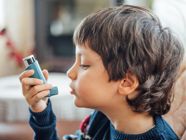Have you ever heard of whooping cough? Or maybe your child has been diagnosed with it and you want to know more about it? We are here to help you and provide you with all the information you need.
What is whooping cough?
Whooping cough is a serious bacterial infection that affects the respiratory system, causing severe and intense coughing fits that are difficult to control and can be strong enough to induce vomiting. The disease is also known as "pertussis," named after the "whooping" noise that may occur when the patient struggles to breathe after a coughing episode. (1)
Highly contagious
Whooping cough is very contagious and spreads easily among children, with an average of one infected person transmitting the disease to 15 other people. (2)
Severity of the disease
Whooping cough represents a global health burden, especially when the importance of administering its vaccine to children according to the national immunization schedule is overlooked. The following points highlight the major risks associated with the disease:(3)
- Infants under 6 months They are most at risk of developing serious complications from whooping cough, as they have not yet received strong immunity from its vaccine. The problems it may cause include: Severe dehydration, breathing difficulties, pneumonia, or seizures.
- After the introduction of the pertussis vaccine during 1950 - 1960, it was observed a sharp decrease (less than 90%) in whooping cough infections and Deaths. This highlights the effectiveness of vaccination in preventing this dangerous disease or at least reducing its health complications. (4)
Symptoms
Whooping cough symptoms appear within 5-10 days of infection, but may sometimes take up to 3 weeks to appear.
Whooping cough begins with mild symptoms resembling a common cold, such as a runny nose, mild fever, and occasional mild cough. However, the symptoms progress after about a week and include: (1)(3)
- Severe and repeated coughing fits, which worsen especially at night and may persist for 10 weeks or more.
- A sharp whooping sound following the coughing fits as the patient tries to catch their breath, distinguishing it from regular coughs.
- Vomiting during or after coughing attacks.
- Extreme fatigue following the coughing episodes.
- The child may turn blue or gray from the intensity of the episodes.
Important note: The symptoms of whooping cough may vary in infants. They might initially have mild coughing or no cough at all, but they could experience episodes of breathing pauses lasting a few seconds. In such cases, immediate emergency care is necessary.
If you think that your child may have whooping cough, book an appointment immediately at the Pediatric Clinic at Al-Ahli Hospital, and get the care your child deserves, with a team of the most skilled doctors.
Ways the disease spreads
Whooping cough may be transmitted to your child through the air, when an infected person sneezes or coughs, releasing the bacteria into the air, which the child then inhales, especially when spending a long time with the infected person in an enclosed space. (5)
Treatment
Antibiotics are the main treatment for whooping cough, but they are of no benefit if the illness lasts 3 weeks or more without treatment. This is because the bacteria have disappeared from the body by this time, but they have caused harm to the body, and this is the reason for the persistence of symptoms. Therefore, early treatment is of great importance in reducing the severity of the disease and its effects on the child. (1)
In some serious cases, whooping cough may require the child to be admitted to the hospital for treatment. (1)
Prevention of whooping cough in children
Vaccines provide the best protection for children and adolescents against whooping cough, and the DTaP vaccine is the recommended vaccine to protect against three serious diseases: whooping cough, diphtheria, and tetanus. DTaP doses are given at 2 months, 4 months, and 6 months of age, followed by booster doses at 15-18 months and again at 4-6 years.
For teenagers aged 11 to 12 years, it is recommended to get a booster dose of the Tdap vaccine, which protects against the same diseases as above. (5)
Is your child's persistent cough worrying you? Hurry and take your child to Al-Ahli Hospital and visit the Pediatric Department! Our doctors are among the elite pediatricians in Qatar and the region.
References
- MedlinePlus - Whooping Cough
- Pasteur Institute - WHOOPING COUGH (PERTUSSIS)
- WHO - Pertussis
- NHS - Whooping cough
- CDC - About Whooping Cough






